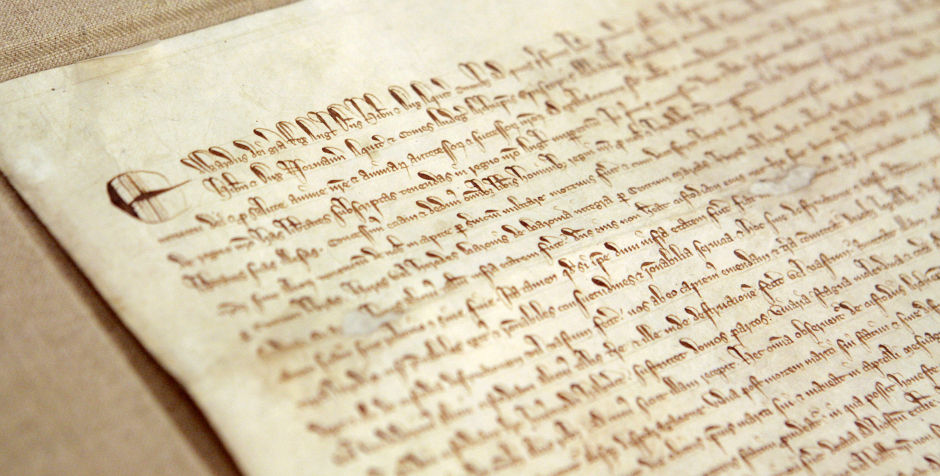Celebrating the Great Charter’s 800th Birthday
This month marks the 800th anniversary of the creation of the Magna Carta, one of the most important documents in history. Although the Magna Carta’s influence was primarily limited to England for the first half of its existence, its subsequent profound impact on the fundamental freedoms that Americans now enjoy is worth celebrating.
The story of the Magna Carta begins with England’s King John, who still holds a well-deserved reputation for being cruel, greedy, and unpredictable—he inspired the “Bad King John” villain of the Robin Hood story. King John imposed unprecedented levels of taxes upon his subjects and used cruel methods to enforce his demands. In response, a group of barons (landowners) renounced their allegiance to the king and revolted. The barons’ capture of London in May of 1215 forced the king to seek a compromise, which resulted in a meeting at Runnymede.
On June 15, 1215, King John agreed to the terms of “the Articles of the Barons” in what was recently referred to as “the most important bargain in the history of the human race.” On June 19, the agreement was formally issued and has since become known as the Magna Carta, meaning the Great Charter. Numerous copies were distributed throughout England at the time, but only five of those originals remain today.
The Magna Carta’s profound impact on the course of history cannot be overstated. It has recently been called “the most valuable export of Great Britain to the rest of the world.” It sets forth many fundamental rights that we now enjoy, such as the right to a jury trial in criminal cases, and embodies the then-revolutionary idea that government leaders are not above the law.
The Magna Carta had some historical precedent—in 1100, King Henry I issued a Coronation Charter in which he promised to abide by certain limits on his power—but those promises were largely ignored over the course of the next century. As such, the barons at Runnymede knew full well that rights confined to paper, but unenforceable in practice, are meaningless.
It could not have come as a great surprise to the barons that, just a few months after the Magna Carta was agreed to, King John repudiated its terms and ignited a civil war. (His subsequent siege of Rochester Castle was portrayed in the movie Ironclad.) After King John’s death, however, his successors found it politically expedient to embrace the Magna Carta; “[m]odern research has revealed as many as forty-four distinct reaffirmations of Magna Carta.”
The 17th Century was critical in the development of the freedoms set forth in the Magna Carta. English lawyers, such as Sir Edward Coke, relied upon the Magna Carta as a source of protection against arbitrary government actions in both England and in the newly-established American colonies, such as in the Virginia Charter of 1606. Significant disputes eventually gave rise to the Petition of Right of 1628, the Habeas Corpus Act of 1679, and the English Bill of Rights of 1689, which helped to fortify the prominence of fundamental rights within English law.
During the 18th Century, scholars such as Sir William Blackstone further emphasized the importance of the fundamental rights set forth in the Magna Carta. America’s founding fathers, well-versed in the works of Coke and Blackstone, invoked concepts outlined in the Magna Carta during their fight for independence and the establishment of the Bill of Rights.
In 1775, Massachusetts implemented a colonial seal, engraved by Paul Revere, that included a man holding the Magna Carta. The Magna Carta’s influence can also be seen when the Founding Fathers campaigned against taxation without representation and later declared, “We hold these truths to be self-evident, that all men are created equal, that they are endowed by their Creator with certain unalienable Rights, that among these are Life, Liberty and the pursuit of Happiness.”
The continued importance of the Magna Carta was illustrated when the British government asked the Library of Congress to maintain one of the few remaining original drafts of the Magna Carta for the duration of World War II. President Franklin D. Roosevelt quipped, “there could properly be criticism if the Magna Carta had been turned over to the executive branch of the government, i.e., the King John of modern days; but . . . as the library is the Library of Congress the precious document has been retained in the safe hands of the barons and the commoners.”
Shortly after the war, British Prime Minister Winston Churchill said, “we must never cease to proclaim in fearless tones the great principles of freedom . . . which through Magna Carta, the Bill of Rights, the Habeas Corpus, trial by jury, and the English common law find their most famous expression in the American Declaration of Independence.” The influence of the Magna Carta can be seen in international human rights protections that were developed after the war.
As Americans, we should never take for granted the extensive freedoms that we enjoy, freedoms that countless millions of people have been denied by kings, tyrants, and despots throughout history. Next month we will proudly celebrate our national independence, remembering the Founding Fathers who risked their lives to assert and protect their rights, but we should not forget that they looked to the Magna Carta as a source of inalienable rights that pre-dated the founding of America.
